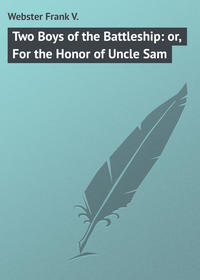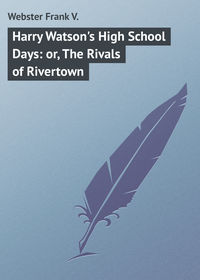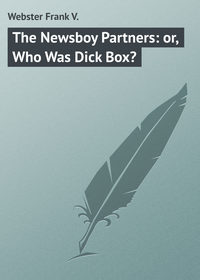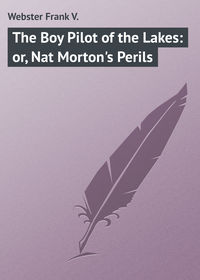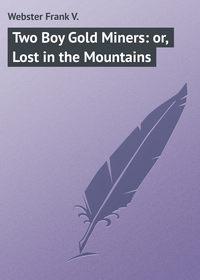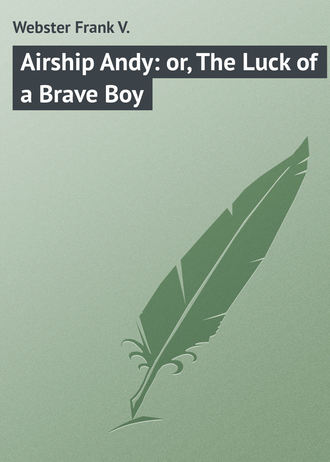 полная версия
полная версияAirship Andy: or, The Luck of a Brave Boy
“Then he’s escaped, or got free somehow,” answered Duske. “He’s that boy of Parks’ who was the winner in the dash for the pony prize.”
“If he is,” came the reply, “you want to hold him a close prisoner till the big race is over.”
CHAPTER XXI – A FRIEND IN NEED
The voices that Andy heard died away in the distance. In about ten minutes, however, they came back again within his range of hearing. The man he believed to be Tyrrell, who in some way had induced Mr. Parks to accept him as a substitute for himself in the aviation race, was speaking to his companion, who was Duske.
“That’s the programme, is it?” he was asking.
“To a T.”
“You will look out for the Nelson boy.”
“Don’t fret on that score. We’ll cage him safe and sound until the race is over.”
“You think I had better use the bottle?”
“Yes, here it is. Stow it anywhere in your clothes.”
“Isn’t there some easier way? What’s the use of fire? It may strike investigators as suspicious.”
“Not at all. They tanked you too full, a spark did the mischief, see? You know enough to descend in among some trees?”
“Of course.”
“Let the flame singe your clothing, tell some sensational story of a hairbreadth escape, and you’ll be quite a hero.”
“You think with the Racing Star out of the way that your machine is bound to win, do you?”
“I know it,” affirmed Duske confidently. “Those other aeroplanes are mere botches. They will do as playthings, but as to distance, they’re not in it with the Moon Bird.”
“All right, I’ll follow instructions. Keep that boy safe. I’d better go. It would be all up with our scheme if Parks should suspect I was your friend.”
Andy fairly writhed where he lay. The plot of the villains was now perfectly clear to him. The man Tyrrell had wormed himself into the confidence of Mr. Parks, who little suspected that he was a confederate of Duske. Tyrrell was to make the start with the Racing Star, pretend that an accident had happened, and burn up the airship.
“What shall I do – what can I do?” breathed Andy. “They don’t intend to let me go until after the race is over to-morrow.”
In about an hour Duske and an old man who seemed to be the cook of the camp came to where Andy lay. Duske released one hand of the captive. The anxious prisoner did not feel much like eating, but he realized that he must keep up his strength. He ate some bread and meat which the cook brought, and drank some water.
Duske tied him up again, tighter than ever. Then he spoke to the cook:
“You get your armchair right outside the canvas flap here, Dobbins.”
“All right, Mr. Duske,” replied the man.
“Every fifteen minutes, right through till morning, you are to look in on that boy. See that he is comfortable, but particularly that he is safe.”
“I’ll attend to it.”
“If you let him get away, you’re out of a job, remember.”
The cook followed out the programme directed by Duske to the minutest detail. Andy had no opportunity to free himself – he was watched so closely. He decided that the effort would be futile. Until midnight he lay wide awake, nervous and worried. Then he made up his mind that it did no good to fret, and got some sleep.
He was given his breakfast about six o’clock in the morning. Then he was tied up again and left to himself. He lay on the mattress so that when the wind blew the canvas lifted and he could look out. He was faced away from the direction of the aviation field, however, and twenty feet away the fence stared him blankly in the face.
From sounds near by and in the distance during the next two hours, Andy could figure out just what was going on about him. The Moon Bird was carried from its aerodrome and taken to the aviation field. The old cook seemed to be left in possession of the camp. He looked in on Andy every so often. The rest of the time he was busy in the larger tent or outside of it with his cooking utensils.
Poor Andy was in sore straits of despair. He had a vivid imagination, and could fancy all that was shut out from his view by captivity. He heard a distant town bell strike nine o’clock.
“In an hour the airships will be off,” soliloquized the captive mournfully, “and I won’t be there.”
Andy pictured in his mind all that was going on at the aviation field. He could fancy the airships ranging in place for the start. He could imagine the animation and excitement permeating the groups of spectators. He shut his eyes and tried to forget it all, so keen was his disappointment.
He heard the band strike up a gay tune. Then a gun was fired. Andy almost shed tears. In twenty minutes the starting signal was due.
“They’ll have a head wind,” he ruminated, as the breeze lifted the canvas at the side of the mattress upon which he lay. “It will be light, though, and won’t hinder much;” and then he thrilled, as he fancied himself seated in the operator’s stand of the splendid Racing Star, awaiting the final word, “Go!”
Andy stared blankly at the fence of the enclosure of the Duske camp. A section of it had been broken down, and the gate left open in removing the airship. Of a sudden he stared eagerly. Some one had come into the enclosure.
The intruder was evidently some casual sight-seer, a boy. His hands were in his pockets, and he strolled about as if curiously inspecting everything that came under his notice. He cast a careless glance at the tent, and was proceeding on his way towards the main aviation field, when Andy gave a great start.
“Silas – Silas Pierce!” he shouted, ignoring discovery by the cook.
Andy’s heart was thumping like a trip-hammer. It seemed as if on the verge of the blackest despair a bright star of hope had risen on the horizon. He had recognized the intruder with surprise, but with gladness as well.
It was his companion of the goose trip, the son of Mr. Pierce – the farmer Silas – whom Andy had last seen at the Collins place, the farm he had visited the day previous. Silas wore a brand-new suit of clothes. He suggested the typical country boy, with some loose cash in his pocket, enjoying a brief holiday to the utmost.
“Hey!” exclaimed Silas, with a startled jump, his eyes goggling all about, and unable to trace the source of the challenge.
Andy uttered a groan. At the moment the breeze let down, and the canvas dropped, shutting him in and Silas out. Then a puff of wind came and lifted the flap again.
“Here, here, Silas!” called out Andy in tones of strained suspense. “Quick – help!”
“I vum!” gasped the farmer boy, staring blankly at what he saw of Andy. “Who is it? And – I say, you’re dad’s great friend, the Nelson boy!”
Silas had advanced, and took in the situation, and recognized Andy slowly.
“Lift up the canvas; come in here,” directed Andy in a more cautious tone of voice. “You remember me, don’t you?”
“Guess I do; but what in the world of wonder is the matter with you?”
“Don’t talk so loud,” pleaded Andy anxiously, fearing the arrival of the cook at any moment. “Some bad men have tied me up. Have you got a knife?”
“Yes; and a brand-new one. Won it in a funny game where you throw rings. See there,” and with great pride Silas produced and opened a gaudily-handled jack-knife.
“Oh, thank you, Silas; I’ll never forget this.”
“Hold on! Say! Thunder! Is he crazy? Stop! Stop!”
In profound excitement, Silas Pierce regarded Andy. The minute he had cut the bonds of the young aviator, Andy had bounded to his feet as if set on springs. Afar from the aviation field there boomed out the second, the get-ready gun.
“Ten minutes!” gasped Andy, on fire with resolve. “I’ve got to make it.”
He swept aside the canvas, headed in the direction of the main camp. Hot on his heels came his amazed rescuer, now a wondering pursuer. Andy ran at the fence, gave a spring, and cleared its top in a graceful leap. Silas, more clumsy, ran at two loose boards, and by sheer force of his might and strength, sent them out of place and put after Andy.
“Nelson!” he bawled. “What’s the matter? Nobody’s following you. Crickey, but you’re a sprinter!”
“I’ll see you later – Parks’ camp – in a hurry.”
In a hurry, indeed, was Andy. He was running against time. As a turn past some tents brought him in full sight of the open field, he was a lone heroic figure – heart, brain and body strained to reach the dainty, natty Racing Star, just being wheeled in place for flight.
There were seven airships entered for the race. These were now stationed a distance of several hundred yards apart, ready to start. The spectators were held back from the dead line by ropes stretched from post to post, but Andy was coming across the field from its inside edge. Silas Pierce was putting after him, puzzled and excited, breathless, and far to the rear. Their unconventional arrival attracted no attention, for those in charge of the airships were engrossed in seeing that everything was right for the start.
The Racing Star was being pushed forward to its starting position. All the others were in place. In a swift glance, Andy made out the Moon Bird, and recognized Duske seated amidships.
Near the Racing Star was Mr. Parks, directing affairs, and Scipio was standing near by. At one side were Mr. Morse and Tsilsuma, deeply interested in the manoeuvres going on.
“It’s Tyrrell!” panted Andy, and he redoubled his speed as he made out the treacherous ally of Duske. Tyrrell was arrayed in leather jacket and gloves, keeping pace with the Racing Star as it moved along. As the airship came to a halt on the starting line, Andy saw him move forward to take his seat amidships.
It was then that Andy massed all his strength of being, accompanied by animated gesticulations, as he shouted out:
“Stop that man!”
CHAPTER XXII – “GO!”
“Andy!” shouted John Parks in a transport of amazement.
“It’s me,” panted Andy, running up to his employer and pointing at Tyrrell. “Mr. Parks, stop that man. He’s a traitor; he’s a villain!”
Tyrrell had heard and seen Andy. He gave a great start. Then he made a move as if to hasten aboard the airship and get out of his way. Mr. Morse and the Japanese hastened forward. The men guiding the aeroplane stared hard at the newcomer.
“Andy, what do you mean?” demanded Mr. Parks, lost in wonderment.
“Just what I say. Don’t let him get aboard.”
“Hold on, Tyrrell,” ordered the aeronaut.
“We’ll lose the start,” spoke Tyrrell hurriedly.
“Don’t you get aboard.”
“No, sah; yo’ just obey Mistah Parks, suh,” interposed Scipio, laying a great hindering hand on the arm of Tyrrell.
“I have been a prisoner in the Duske camp since yesterday,” explained Andy, catching his breath. “This man Tyrrell came there last night. He is in the employ of Duske.”
“What!” shouted Parks, his face growing dark.
“It’s true, Mr. Parks,” asseverated Andy. “They are in a plot to burn the Racing Star and have you lose the prize.”
“Do you hear what this boy says?” thundered the aeronaut, moving down on Tyrrell with threatening mien.
“It’s – it’s not true,” declared Tyrrell, but turning pale, shrinking back, and looking about him for a chance to run.
“If you don’t believe me,” cried Andy, “search him.”
Scipio held Tyrrell’s arm in a viselike clasp. Parks ran his hand over his clothing. He drew from his pocket a parcel done up in a handkerchief. Mr. Morse took it, opened it, and revealed a bottle filled with some substance like kerosene, a small box of matches and some lint. Quick as a flash the hand of the aeronaut shot out for the throat of Tyrrell.
“You treacherous scoundrel!” he shouted.
Boom!
“The third gun! They’re off, Mr. Parks,” cried Andy. “Oh, don’t let the Racing Star miss it.”
“What can I do?”
“Send me. Men, get ready. Mr. Parks, I’ll win this race!”
Andy was in no trim physically or in attire to attempt the race. At a glance the aeronaut saw this. But our hero was irresistible. He ran towards the machine, and with nimble movements he glided among the planes and reached the operator’s seat. Already the other airships were sailing skywards.
“Go!” shouted Andy.
Upon the operator’s seat lay the skull cap and goggles, ready for Tyrrell, and Andy hastily donned them. He heard the voice of Parks, now as excited as himself, giving orders, a tacit consent to make the start.
There was a run of scarcely a hundred feet along the grass. Andy placed a firm hand on the wheel. Then came a series of curves and sweeping arcs, which kept the crowd of spectators turning first one way and then the other in entranced silence.
The young aviator followed the popping of the motors of the contestant machines. One was fast becoming a mere speck in the sky.
“The Moon Bird, Duske’s machine,” murmured Andy.
It seemed poised in the air without motion, so direct was its course, so true its mechanism. Two of the other airships had already descended, one of them wrecked and out of the race. The forty-foot mechanical bird, the Duske machine, however, had made the lead and kept it.
The climax came in Andy’s preliminary ascent. Now the Racing Star, light and dainty as a lark, mounted with amazing speed. A glance at three of the airships convinced Andy that they were too faulty to make a record. The Moon Bird, however, was a marvel. From what he had heard Mr. Parks say, Duske had been an expert balloonist, and he now showed amazing ability in the aviation line. He seemed to be putting the stolen airship idea to marked advantage.
Andy struck a level about fifteen hundred feet in the air. There was a head wind, but it was not strong. Andy put on fine speed gradually. The Racing Star passed two of the contestants, and, fully in action, he drove keen on the trail of the Moon Bird.
The train that acted as a pilot with an American flag on its last car, Andy kept in view as a guide. When they came to Lake Clear, the Moon Bird did not follow the rounding land course, nor did Andy. Lake Clear was a shallow body of water, but of considerable extent, and dotted here and there with little islands.
Suddenly the Moon Bird, a machine of good utility, but, as Andy knew, of little lasting power, made a decided spurt, passed the Racing Star, and at a distance of half a mile got fairly abreast of the lake. It was here that Duske met his Waterloo. Hitherto he had maintained practically a steady course. More than once Andy had got near enough to this rival to hear the loud gasping of the tube exhausts drown out the sharp chug-chug of the motor. Suddenly Duske made a sharp turn.
An appalling climax followed. In consternation and suspense Andy watched aerial evolutions that fairly dizzied him.
“He is lost!” breathed Andy, a-thrill.
In an instant he recalled what Mr. Morse had told him of the unfinished model that Duske and his crowd had stolen from him. The inventor had explained to Andy that while the suction principle involved in the rudder construction was unique and bound to increase speed, there should have been added automatic caps to close the rear ends of the suction tubes where a curve was attempted.
Of this Duske evidently knew nothing. The moment he turned the machine, however, there was a whirl. The aeroplane described a dive, then a somersault. Its lateral planes collapsed, and, tipping from side to side, it began to descend with frightful velocity.
Once it half righted, balanced, went over again, and, fifty feet from the ground, shot clear of a little islet, and went down in the water of the lake, a wreck, first spilling Duske out.
“He is killed or stunned!” exclaimed Andy.
The boy aviator saw the other airships forging ahead, indifferent to the accident. Minutes counted in the sixty-mile race to Springfield and back to the starting point, but Andy was humane. He saw clearly that, if alive, the half-submerged Duske would be suffocated in a few minutes’ time.
“I can’t leave him to die,” murmured Andy, and sent the Racing Star on a sharp slant, landing on the island.
Andy was soon out of the airship. He waded to the spot where Duske lay, and dragged him bodily up on dry land. As he turned him on his face, Andy knew from its purple hue, the lifeless limbs and choked gasps of the man, that another minute in the water would have been his last.
A boat put out from the mainland where a crowd of spectators was watching the race. Four men jumped out as the island was reached.
“Take care of this man,” ordered Andy.
“You’re a pretty fair fellow to risk losing the race to save a competitor,” spoke one of the men heartily.
He and his companions followed Andy’s instructions the best they could in starting the Racing Star, and Andy shot skywards again, making up for lost time.
CHAPTER XXIII – THE GREAT RACE
“Hurrah!”
“Why, it’s only a boy!”
“Parks’ man – get your rest, lad, while we see to things.”
Andy found himself in a whirl of motion and excitement. When he had left the island where he had sacrificed his time and risked his chances of winning the race, he had discovered that he was fourth on the programme. The Flash was becoming a distant speck, and the two other contesting biplanes were lagging after the leader.
Andy now set a pace to force the Racing Star to do its utmost. His good knowledge of detail as to the machinery and his masterly manipulation of the same soon brought results. The Racing Star easily passed two of the airships ahead. Then Andy ran neck-and-neck with the pilot train for several miles.
The Flash, however, kept up admirable speed, but finally a wing broke or oil ran out at Wayne, and the operator descended to a relief station.
Now was Andy’s chance, and he made the most of it. With those inspiriting shouts of “Hurrah! Why, it’s only a boy!” and the announcement from the relay posted at Springfield by Parks that they were on hand to tank up the Racing Star and adjust the machinery, Andy landed at the outskirts of the city, just half the race distance covered.
It made him quite dizzy-headed to sail down along a vast sea of human beings, wild with enthusiasm at greeting the leader so far in the race.
Two men took entire charge of the Racing Star, with quick movements, tanking, oiling the cylinders, testing every part of it. A third man brought Andy a tray containing a cup of steaming coffee, one of beef tea, and some crackers.
“There she comes!”
“Hurrah No. 2!”
“The Flash!”
“And there she goes!”
“All aboard, Parks,” sang out the leader of the relay gang, and with a glide and a whiz the Racing Star was once more up in the air.
Again the Flash was in the lead. Having been supplied with fuel and oil at its recent stop, the operator did not make any halt at the turning post. Andy felt fresh and ambitious, and the Racing Star responded loyally to every touch of wheel and lever.
Fifty feet from the ground a wheel dropped from place, but Andy paid no attention to this. The train did not act as pilot on the return trip. Instead, at intervals of five miles to indicate stations, smudges were being sent aloft. Andy made a direct run for the first one of these, mapping out his route from those dimly visible on the course ahead.
At Dover Andy passed the Flash. For the next five miles they kept pretty well abreast.
The last smudge was about eight miles from Montrose. Andy flew past it making a circular turn as he plainly made out the aviation field in the distance. His competitor made a short cut, lost on a turn to strike the straight course and Andy overtook him.
Now it was that Andy tensioned up the splendid machine to its highest power. The white expanse of canvas and wood shivered and trembled under an unusual strain.
“In the lead!” cried Andy in delight, and his eyes sparkled through the goggles as he took a swift backward glance. The Flash was bungling. Its progress was a wobble and its operator was at fault in striking an even balance.
The speed of the Racing Star had now been increased to its utmost.
“Five minutes more, six at the most, will decide the race,” breathed Andy. “I can’t lose now.”
The Racing Star was no longer a bird afloat, but an arrow. Giving to the machine a certain slant, calculating to a foot how and where he would land, Andy saw nothing, thought of nothing, but the home post.
He was conscious of a frightful bolt downwards that fairly took his breath away. There was a blur of flying fences, buildings, tents, a green expanse, a sea of human faces, a roar as a great shout went up, and the Racing Star met the ground on a bounce, and Andy Nelson was the winner of the great race.
Our hero did not step from the airship as eager, willing hands eased the Racing Star down to a stop. Cheering, excited men fairly pulled him over the drooping planes. Some one hugged him with a ringing yell of delight, and John Parks’ voice sounded in his ears.
“Oh, you famous boy – Andy, my lad, it’s the proudest moment of my life!”
Mr. Morse caught Andy’s hand, his serious face flushed with pride.
“The Racing Star did it,” said Andy.
“Yo’ did it, chile, and yo’ did it brown,” chimed in Scipio, his mouth expanded in joyous delight from ear to ear.
John Parks never let go of Andy’s arm as they made their way through the crowds to the main aerodrome stand. The official starter had unscrewed the speedometer and elevation gauge. He ran before them to the stand. Someone quickly chalked a legend on the big, bare blackboard. It ran:
Start of flight – 10:04.
Finish – 11:39.
Distance traveled – 60 miles.
Maximum height – 1,200 feet.
Wind velocity – 12 miles from the west.
Winner – Racing Star.
Operator – Andy Nelson.
Somehow the boy aviator thrilled as he read his name at the bottom of the little legend.
“It’s like a dream, Mr. Parks – just like a dream,” and his voice was faint and dreamy in itself.
“Don’t collapse, lad,” directed the aeronaut anxiously – “the best is to come.”
“It’s only the reaction,” said Andy. “To think I did it – me, only Andy!”
“There isn’t another Andy like you in the whole world,” enthusiastically declared Parks. “Yes, sir,” as a man waved to him from the table on the grand stand.
“Here’s the check, Parks,” notified the judge.
“Well, we’ve won it, haven’t we?” chuckled the aeronaut.
“You have, and it’s ready for you. A pretty piece of paper, hey – five thousand dollars. Make it out to you?”
“I’ll take it in two checks,” answered Parks.
“Mr. Parks – ” began Andy.
“There’s only one check for the whole amount,” replied the judge, “and only the name left to be filled in.”
“Oh, that’s the way of it, eh?” said the aeronaut. “All right, fill it in John Parks and Andy Nelson. I reckon, Andy, I can’t get that twenty-five hundred dollars away from you without your signature.”
He poked Andy in the ribs in jolly fun. He was all smiles and laughter as he shouted an order to Scipio to hurry home and get up the best celebration dinner he knew how. Then, Andy following him, he stepped forward to take the arm of Mr. Morse, and thus, the Japanese walking with Andy and congratulating him on his great feat, they crossed the field away from the crowds.
Some one broke over the dead line ropes and made a dash after them, yelling loudly:
“Andy, oh, Andy Nelson!”
“Hold on there!” ordered an officer, trying to head off the trespasser.
“Silas Pierce!” exclaimed Andy.
“He goes with us, officer,” called out Parks. “You bet you go with us, you grand old hero!” he cried, giving the farmer boy a joyful, friendly slap on the shoulder.
“Yes, indeed,” smiled Andy, catching the arm of Silas and hugging it quite, “if it hadn’t been for you, there would have been no race.”
“Andy,” gasped Silas, “I can hardly believe it. Why you’re famous.”
“Am I?” smiled Andy.
“And rich.”
“Rich in good friends, anyway,” replied Andy.
“I hung around. When I saw you coming in on the lead, I nearly fell flat I was so excited,” declared Silas.
“I want a chance for a little talk with you, Silas,” said Andy. “I want to show you how much I appreciate what you have done for me.”


